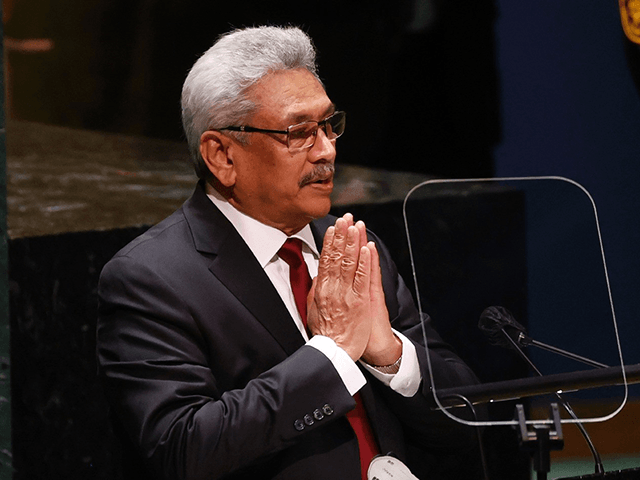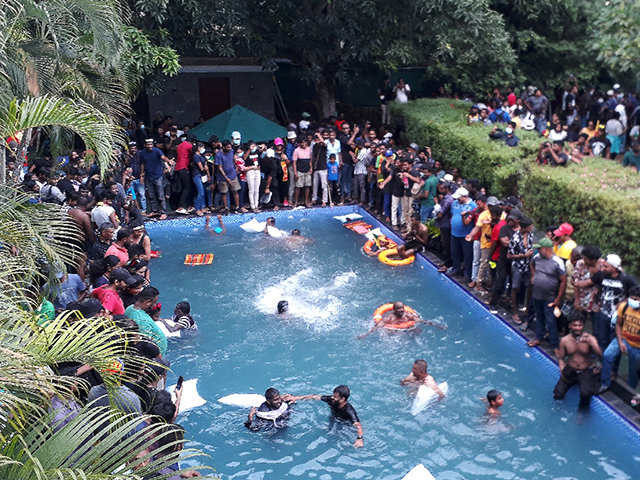President Gotabaya Rajapaksa of the Democratic Socialist Republic of Sri Lanka officially confirmed his intention to resign on Monday following a national wave of vandalism and mob protests that culminated with apparently thousands of people storming his house and bathing in his pool.
Sri Lanka has experienced months of protests – many of them violent, including a wave of arson attacks on politicians’ houses and a shootout that killed a member of Parliament – following the collapse of its economy this year. Under the ruling Rajapaksa family, which at one point had over 40 of its members in high-level government positions, the Sri Lankan economy went on lavish spending sprees for infrastructure and social programs that never materialized. Much of that debt went to China under its Belt and Road Initiative (BRI), a predatory scheme targeting poorer countries with promises of state-of-the-art road and railway projects.

Sri Lankan President Gotabaya Rajapaksa addresses the 76th session of the UN General Assembly on September 22, 2021, in New York. (JOHN ANGELILLO / various sources / AFP)
The Rajapaksas also recently implemented an impoverishing “green” ecological scheme that included the banning of chemical fertilizers — rendering the nation dependent on food imports for the first time in its history — and outsized expenses on ill-fated attempts to eliminate fossil fuels.
As a result, the nation is bankrupt and its economy has “completely collapsed,” Prime Minister Ranil Wickremesinghe announced in late June. For the average person, this has manifested itself in the form of a near-total absence of gasoline and other critical fuels, such as cooking gas, nationwide; over a dozen people dying on long ration lines for oil-based fuels; daily scheduled power outages; empty store shelves and shops, leaving children at risk of malnourishment; a near-total lack of medicine that has shut down hospitals and clinics; and closed schools and local businesses as people do not have fuel to travel to school or work.
“My children are miserable. They’re suffering in every possible way. I can’t even afford a packet of biscuits or milk for my babies,” a Sri Lankan mother told the BBC in a report published last week.
Protesters burned down Wickremesinghe’s house on Saturday.
#WATCH | Sri Lanka: Amid massive unrest in the country, protestors set ablaze the private residence of Sri Lankan PM Ranil Wickremesinghe#SriLankaCrisis pic.twitter.com/BDkyScWpui
— ANI (@ANI) July 9, 2022
Protesters burned down his predecessor Mahinda Rajapaksa’s house in May. Mahinda is widely credited as the president that led Sri Lanka out of its 26-year-old civil war in 2005, prior to becoming prime minister this year, and is the current president’s brother.
Update: PM Mahinda Rajapaksa’s residence in Kurunagala set on fire. pic.twitter.com/LaHOKztt27
— DailyMirror (@Dailymirror_SL) May 9, 2022
Gotabaya Rajapaksa formally informed Wickremesinghe, who himself announced his intention to soon resign, that he would step down on Monday, according to Sri Lanka’s Ada Derana news outlet.
“To ensure a peaceful transition, the president said he will step down on July 13,” Speaker of Parliament Mahinda Yapa Abeywardana, likely to serve as interim president until the nation’s elites organize an “all-party” government, announced. Gotabaya Rajapaksa announced that Abeywardana would be the only official source of communications from the president in the immediate future this weekend — a task Abeywardana failed at almost immediately by falsely telling the BBC on Monday that Rajapaksa had left the country.
Ada Derana reported that the nation’s Parliament announced it would organize a session on Friday to discuss building a new government. The group is reportedly expecting to choose presidential nominees on July 18 and hold a national election on July 20.
As a socialist state, Sri Lanka has no major conservative parties. The Rajapaksa party, the Sri Lanka Podujana Peramuna (SLPP), is a socialist, big-government party and holds the majority in parliament. The main opposition party, Samagi Jana Balawegaya (SJB or United People’s Power), promotes what political writers and journalists in the country describe as a “center-left” ideology. Many of the nation’s smaller parties are either ethnic-centric — representing, for example, the Tamil minority — or are openly socialist.
India’s the Hindu named the two most likely men to take over for Gotabaya Rajapaksa as “long-time Rajapaksa loyalist Dullas Alahapperuma, an MP from Matara district, and Opposition Leader Sajith Premadasa.” Premadasa is the head of the SJB party.
The newspaper observed that, while the leaders of the major parties are insisting on establishing an “all-party” government, many of the Parliament’s smaller entities are keeping a distance, expecting the plan to fail.
Protests erupted demanding Gotabaya Rajapaksa resign early this year in response to the growing food, fuel, and medicine shortages. The protests prompted Rajapaksa to slowly shed cabinet members in resignations, including other Rajapaksa family members, but the president steadfastly refused to depart himself. Mahinda was the last Rajapaksa to resign besides the president and departed after protesters burned down his house.
In an apparent attempt at replicating the results of attacking Mahinda Rajapaksa’s residence, protesters stormed Temple Trees, Rajapaksa’s residence, on Saturday. Dramatic images of seemingly thousands of protesters descending on the building made their way around the world this weekend.
Colombo, Sri Lanka right now. The Presidential Palace has been stormed, President Gotabaya Rajapaksa is said to have fled. Unbelievable scenes. Live reports on @IndiaToday: https://t.co/p6JV6FzCub pic.twitter.com/8zlJdBfN2P
— Shiv Aroor (@ShivAroor) July 9, 2022
Once inside, protesters made themselves at home, using Rajapaksa’s pool, shower, beds, and kitchens.
3/4 pic.twitter.com/OwtlXFAnMn
— DailyMirror (@Dailymirror_SL) July 9, 2022
4/4 pic.twitter.com/a9TQTzZ1xr
— DailyMirror (@Dailymirror_SL) July 9, 2022
Video footage circulating on social media shows protestors bathing at President’s House. pic.twitter.com/cMfoYV6VXu
— DailyMirror (@Dailymirror_SL) July 9, 2022
Some protesters found nearly 18 million Sri Lankan rupees (about $50,000) in cash in Rajapaksa’s home and handed it to police, news agencies reported this weekend.

COMMENTS
Please let us know if you're having issues with commenting.